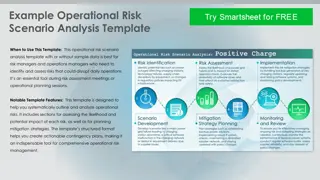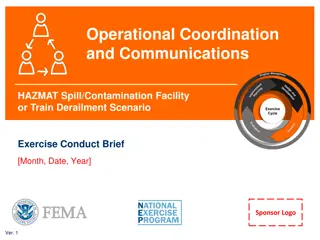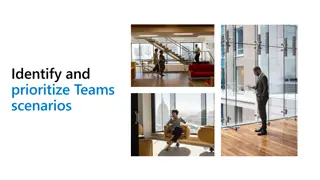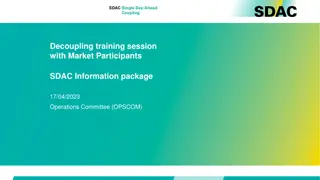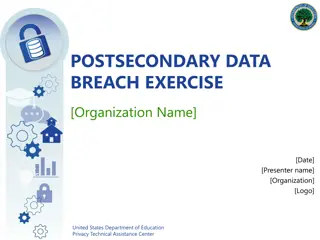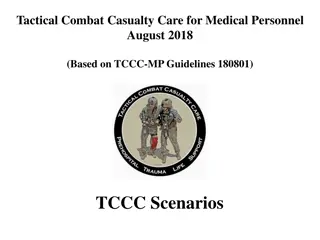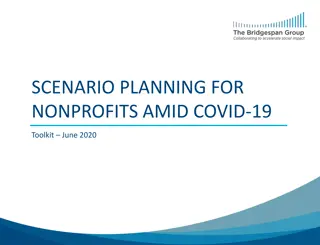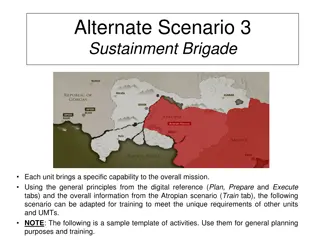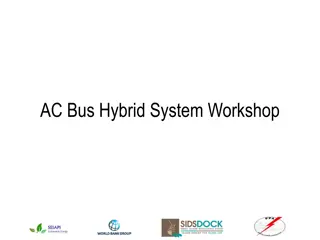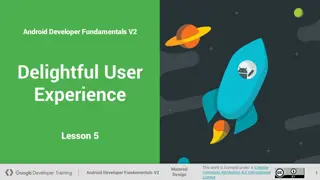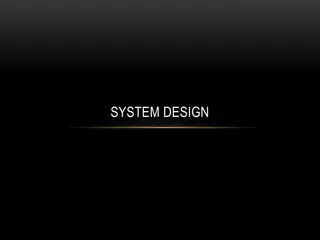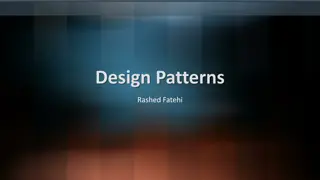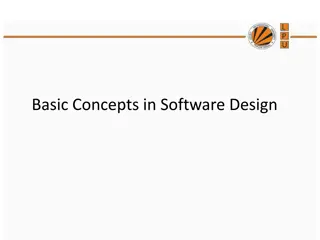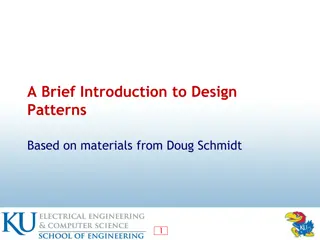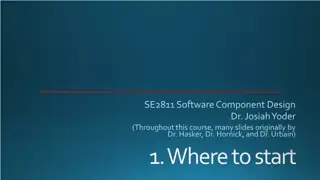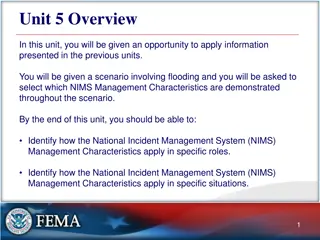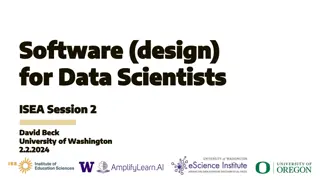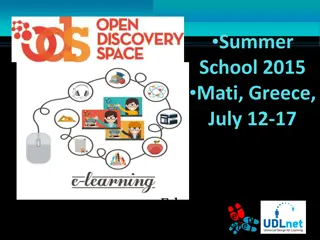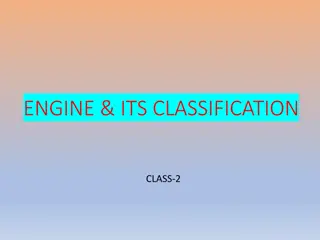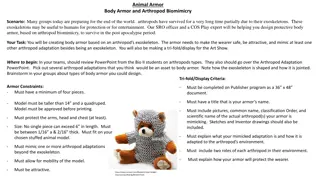Understanding Software Analysis and Design Process
Software analysis and design involve a systematic approach to understanding user requirements, creating logical models, and transitioning to detailed design specifications. Requirements analysis focuses on capturing system requirements, while design translates these requirements into implementation
7 views • 16 slides
Paladin Security Tabletop Exercise Template
In this tabletop exercise template by Paladin Security, participants have the opportunity to test the efficacy of emergency response plans in a safe environment that encourages active participation and respect for others. The exercise involves responding to a scenario and adapting strategies based o
3 views • 17 slides
Comprehensive Operational Risk Scenario Analysis Template
This template aids risk and operations managers in systematically identifying, assessing, and mitigating operational risks that could disrupt daily business operations. It allows for detailed risk analysis, scenario development, and mitigation strategy planning to ensure effective risk management. C
0 views • 4 slides
Insights into Creating and Maintaining Catalogues for Automated Driving Systems
The document discusses the importance and challenges of developing scenario catalogues for Automated Driving Systems (ADS). It highlights the need for organized methods, user and IT expertise, common formats, and expert analysis in creating and maintaining such catalogues. The focus is on the scenar
0 views • 7 slides
Operational Coordination and Communications HAZMAT Scenario Exercise Conduct Brief
The document serves as the Hazardous Material Spill/Contamination Facility or Train Derailment Scenario Conduct Slide Deck for the Operational Coordination and Communications Principals Strategic Priority. It includes guidelines for tailoring the exercise to an organization's needs, conducting the s
0 views • 45 slides
Hurricane Scenario Tabletop Exercise: Enhancing Emergency Response Preparedness
Engage in a tabletop exercise focused on a hurricane scenario to enhance emergency response preparedness. The exercise includes introductions, agenda review, scenario discussions, action planning, and benefits such as improved readiness and skills practice in a safe environment. Objectives aim to re
0 views • 31 slides
Effective Use Case Scenario Identification and Prioritization for Teams
Well-defined destination, business outcome focus, and scenario examples play crucial roles in identifying and prioritizing use case scenarios. Exercise tools guide teams in successful scenario identification while considering business impact, transformation, and quick wins. Sample scenarios and a st
0 views • 19 slides
Market Decoupling Training Session with SDAC Information Package
Decoupling training session organized for market participants to prepare for handling a full decoupling scenario in the SDAC market. The session includes background information, goals, scenario simulation, operational processes, coordination, evaluation, and fallback solutions. Date and timeslot set
2 views • 10 slides
Postsecondary Data Breach Exercise: Prepare for the Unexpected!
This tabletop exercise simulates a data breach scenario within a complex organization, engaging participants to make critical decisions and respond effectively. Teams will work together to uncover the extent of the breach and devise a response plan. Consider various roles needed in your organization
0 views • 31 slides
Understanding Progressive Hedging Algorithm in Operations Research Seminar
Explore the Progressive Hedging algorithm discussed in the Graduate Seminar on Operations Research. Topics include general framework, resource allocation examples, and handling non-convexity in decision-making. Dive into scenario decomposition and scenario-specific decision-making for well-hedged so
0 views • 28 slides
Tactical Combat Casualty Care in Action: SEAL Casualty Scenario in Afghanistan
Experience real-life combat trauma management in action through a SEAL casualty scenario in Afghanistan. Follow the first responder's account of assessing and treating a teammate with severe injuries, highlighting the challenges and critical decisions made in the field.
0 views • 109 slides
TCCC Critical Decision Case Studies: Bleeding Management Scenario
This presentation focuses on a critical decision case study in Tactical Combat Casualty Care (TCCC) involving a casualty with high amputations and ongoing massive hemorrhage. The scenario explores the challenges of managing uncontrolled bleeding in a combat situation and provides insights into the r
0 views • 139 slides
Guidelines for Design of Cement Concrete Pavement and Interlocking Paver Blocks
This document provides guidelines for designing cement concrete pavements and interlocking paver blocks, covering factors governing design, wheel loads, design period, subgrade characteristics, approximate k values based on CBR values, and the importance of a sub-base below concrete pavements. It em
0 views • 67 slides
Maximizing Profits in Production Scenarios
Explore two production scenarios to maximize profits using optimization models. The first scenario involves a cookie store with constraints on cookie production and labor hours. The second scenario features a computer factory maximizing profit considering production line and labor constraints. Learn
0 views • 14 slides
Understanding the Carbon Scenario Tool for Climate Change Management
The Carbon Scenario Tool (CST) is a valuable resource developed by the University of Edinburgh and the Scottish Funding Council to manage, report, and forecast carbon emissions for university estates and operations. It enables the calculation of the impact of carbon reduction projects and the develo
2 views • 18 slides
Nonprofit Scenario Planning Amid COVID-19 Toolkit
The toolkit provides a four-step scenario planning process to help nonprofit leaders navigate uncertainty caused by COVID-19. It emphasizes identifying key drivers, developing scenarios, creating action plans, and determining trigger points for effective decision-making. This approach focuses on con
0 views • 8 slides
Software Engineering Design Principles and Concepts
The chapter discusses the essential principles and concepts in software design, highlighting the four key design models - data design, architectural design, interface design, and component-level design. It emphasizes the importance of traceability to the analysis model, minimizing the gap between so
0 views • 36 slides
Training Scenario for Sustainment Brigade Deployment Preparation
Adapted training scenario for deploying a sustainment brigade featuring specific unit capabilities and planning tasks for Phase 0 deployment at Fort Hood, TX. Includes analyzing mission specifics, integrating religious support, and executing deployment tasks. Detailed overview of the Atropian scenar
9 views • 7 slides
Design Overview of AC Bus Hybrid System Workshop
This content provides a walkthrough of the design decisions involved in an AC Bus Hybrid System Workshop, focusing on the use of a generator and PV array. It covers the scenario of a village using a diesel generator, customer requirements, site information, system arrangement, and more to help under
0 views • 51 slides
Understanding System on Chip (SoC) Design and Components
Explore the world of System on Chip (SoC) design, components, and working flow. Learn about Intellectual Properties (IP), platform-based design, typical design flows, top-down design approach, and the emerging Electronic System Level (ESL) design flow. Discover the essential components of an SoC, su
0 views • 45 slides
Exploring Design Inspiration and Elements in Costume and Fashion Design
Dive into the world of costume and fashion design through a visual journey of finding design inspiration, understanding the design process, emphasizing originality, and exploring different sources of creativity. Discover how technology, art, food, history, architecture, and nature can spark innovati
0 views • 45 slides
Enhancing Piping Design Efficiency with Spec-Driven Technology
Explore how Spec-Driven Piping technology powered by CADACTIVE offers a standardized approach for piping design in Creo Parametric. This innovative extension streamlines design communication, eliminates errors, and improves design efficiency by utilizing a master catalog, automated checking capabili
0 views • 15 slides
Rotary District 6630 Youth Protection Scenarios
This content provides scenarios related to youth protection in a Rotary setting. Scenario #1 involves handling inappropriate behavior at a club meeting, while Scenario #2 addresses allegations of sexual harassment within an Interact club sponsored by Rotary. Key points for each scenario offer guidan
0 views • 15 slides
Material Design: Combining Classic Design Principles with Technological Innovation
Material Design is a design language that combines traditional design principles with the possibilities offered by technology and science. It emphasizes visual language, classic design elements, and innovation to create delightful user experiences. The Material Metaphor, Imagery, Typography, Color,
0 views • 34 slides
Comprehensive Guide to System Design Components and Techniques
System design involves the detailed planning and identification of components in an information system, aiming to provide users with a general understanding of the new system. This process includes techniques like flowcharts, prototyping, and component design, covering aspects such as output design,
0 views • 24 slides
Understanding Design Patterns: A Comprehensive Overview
Exploring the world of design patterns, this content delves into the essence of design patterns, their application in software design to resolve complexity, and the different types of design patterns - creational, structural, and behavioral. It also showcases examples of popular design patterns such
0 views • 22 slides
Understanding Basic Concepts in Software Design
Software design involves transforming customer requirements into a form suitable for implementation, with activities categorized into preliminary and detailed design stages. High-level design focuses on module identification and control relationships, while detailed design entails defining data stru
1 views • 24 slides
Exploring 3D Design and Critical Analysis in Architecture
Dive into the world of 3D design and critical analysis with a focus on architecture. Discover the stages of design, essential skills for designers, and areas of study in three-dimensional design. Delve into iconic buildings like Frank Lloyd Wright's Falling Water, analyze their key features, and eve
0 views • 9 slides
Understanding Design Patterns in Object-Oriented Design
Design patterns in object-oriented design (OOD) are essential templates that codify best practices for solving common problems. They help streamline development by capturing proven design decisions, promoting code reuse, and enhancing system flexibility and modularity. Learn about the core concepts,
0 views • 20 slides
Understanding Interaction Design in Human-Computer Interaction
Interaction design focuses on creating interactive products that are easy, effective, and enjoyable to use. It aims to reduce negative user experiences while enhancing positive ones. Designing interactive products requires understanding user activities, interfaces, and device arrangements to support
0 views • 11 slides
SE2811 Software Component Design Overview
This course covers software component design, design patterns, object-oriented design, algorithms, and opportunities for reuse in systems design. It emphasizes the importance of domain-level design and provides insights into solving core problems through reusable classes.
0 views • 21 slides
Skills Needs Identification and Scenario Development in Agriculture and Forestry Sector
This project aims to identify skill needs through state-of-the-art training, focus groups, and questionnaire design. It involves scenario development based on trends in sustainability, digitalization, and bioeconomy. The project will analyze past projects, EU policies, and best practices to harmoniz
0 views • 5 slides
Analysis of Bunch Lengthening in CEPC for Different Design Parameters
This study explores bunch lengthening in the Circular Electron Positron Collider (CEPC) for various design parameters, analyzing a 54 km design scheme, a 61 km design scheme, and a 100 km design scheme. The analysis includes the theoretical framework used, equations for bunch lengthening, and conclu
1 views • 15 slides
Understanding Plain & Reinforced Concrete Structures in Design Engineering
In the design of Plain & Reinforced Concrete structures, various strength design methods such as Ultimate Strength Design (USD) and Allowable Strength Design (ASD) are utilized. These methods involve factors of safety, material strength, load factors, and analysis in the elastic range. Additionally,
0 views • 11 slides
Verilog Adder Examples & Typical IC Design Flow
This comprehensive content delves into Verilog adder examples, typical IC design flow, physical design considerations, and examples of OpenGL ES GPU and ARM hypervisor applications. It covers the fundamentals of digital logic with Verilog design, hardware description language, FPGA prototyping, phys
0 views • 27 slides
Understanding NIMS Management Characteristics in a Flooding Scenario
In this unit, participants will delve into a scenario involving flooding in Emerald City to apply their knowledge of NIMS Management Characteristics. They will work in groups to analyze the situation and identify which characteristics are demonstrated. The scenario evolves as heavy rain leads to eva
0 views • 14 slides
Understanding the Importance of Software Design for Data Scientists
Today's ISEA Session 2 with David Beck from the University of Washington delves into the critical role of intentional software design for data scientists. The session covers the software design approach, user-centric design stories, use cases, components, testing strategies, and the benefits and dra
0 views • 76 slides
Innovative Educational Scenario for Teaching Principles of Dynamics
This educational scenario focuses on the principles of dynamics, emphasizing the causality in physics through inductive teaching methods. Students are engaged in experiments to understand the concept of motion and causality in a multidisciplinary approach involving maths, science, ICT, psychology, a
0 views • 15 slides
Understanding Engine Classification and Design
Engine classification involves categorizing engines based on various factors such as combustion type, number of strokes, cylinder design, and ignition method. Common classifications include external and internal combustion engines, as well as categories based on the design and use of the engine. Add
0 views • 11 slides
Arthropod Biomimicry: Designing Protective Body Armor for Post-Apocalyptic Survival
In a scenario where groups are preparing for the end of the world, the concept of arthropod biomimicry is employed to design protective body armor for humans inspired by the exoskeletons of arthropods. The armor is required to ensure safety, attractiveness, and mimic other arthropod adaptations apar
0 views • 4 slides


